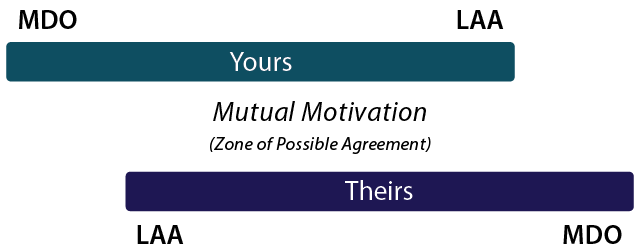You only get one chance to open so it has to be right.
It’s time to begin Bargaining.
Think big, not small. Start high, start low – just don’t start in the middle.
You now have room to move…to give. The process of giving and getting, adding and subtracting, coming and going, builds trust like no stingy power play ever can.
What matters most?
Your opening proposal should always reflect your Most Desired Outcome (MDO).

MDO, your Most Desired Outcome, is the result you want and can defend.
- It is bold and assertive, but not aggressive.
- Opening proposals should reflect your MDO.
- MDO is better than Goal and LAA; it is the most desirable of all outcomes.
- Although it is not always achieved, the MDO is achievable. If no one has ever gotten the MDO you seek, it is possibly too aggressive and not defensible.
- The MDO challenges you and the other side to be more creative.
| Three Approaches to Reflecting your MDO in your Opening Proposal | Example |
|---|---|
| 1. Directly | I want you to add 3 new team members to your crew. |
| 2. Vaguely | I want double-digit productivity gains. |
| 3. Using economically equivalent options |
I want either
|

Why don’t we open based on our well thought-out MDOs?
| Reason | Common Mistake | Caution |
|---|---|---|
| Interests | We are uncertain of our own interests or we are uncertain of their interest. | Never present an opening offer before fully understanding all the parties true interests. |
| Relationship | To much emphasis on the relationship and not enough on the outcome. | Beware of your Fear of losing the relationship. |
| Impatience | We take the easier route and open at our Goal, because we perceive we will get there eventually anyway. | Starting at your Goal is more likely to lead the other side to think they can achieve a better result with bargaining, pressuring you to your LAA. BNP 4: Build in time and be patient. |
| Untested assumptions, Lack Benchmark |
We base our opening on assumptions about what the other side will find reasonable or will accept, and have failed to test those assumptions in the Exchange Stage. Or we lack a precedent, benchmark, or a standard to value what we are giving up |
BNP 7: Beware of your assumptions. Better to take time for further exploration with hypotheticals that will test your assumptions, allowing you to adjust your MDO. |
| Overly aggressive opponent | The other side opens at a position that is not within the Envelope of Reasonability and makes us doubt our position. | At a minimum, caucus (meet privately with your team) and reflect on the data that drives your MDO. Don’t fall prey to the anchoring tactic that encourages you to be less aggressive in the face of an unreasonable demand. |
| Self-defeating talk | There is a temptation to pre-negotiate with yourself before you have heard the other side’s position. | You can always re-adjust your position after seeing what options are available to reach your MDO. |
- Before you make any proposals, ideally assumptions and anything you don’t know must become known-facts.
